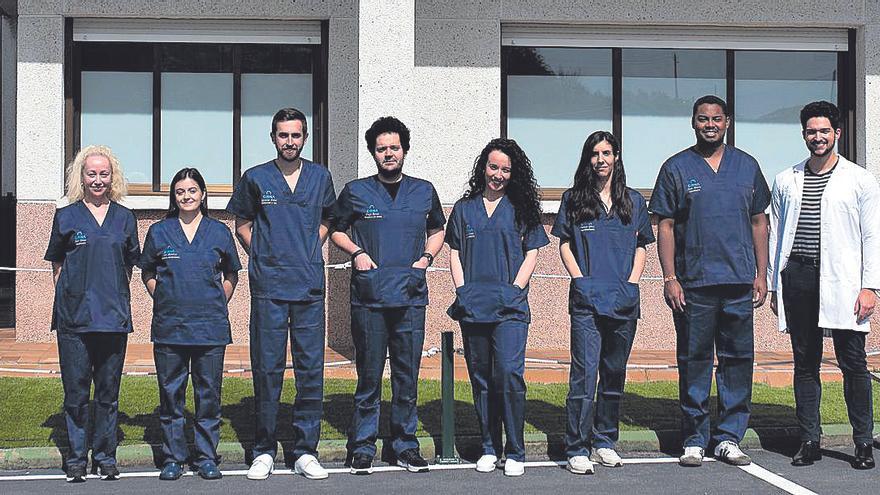CIRNA, commitment to comprehensive patient rehabilitation

In Asturias there is an innovative rehabilitation center for patients suffering from any pathology or injuries. This is the Comprehensive Center for Advanced Rehabilitation (CIRNA), located at 47A in the village of Los Escalones, just five minutes from Oviedo. A center that was created with the goal of improving the quality of life and well-being of its patients and which provides comprehensive rehabilitation – both physical and mental – through innovative treatment methods using therapeutic exercises. And this is where they matter.
This revolutionary center has capabilities that make it unique in the region. It brings together different spaces in one building: an open circuit for working with people with disabilities, the first 100% adapted housing simulator, allowing people to automate daily activities depending on their abilities; the first gym adapted for people who want to continue rehabilitation after being discharged for health reasons; a splint making room where custom splints are made, or dedicated areas for training, conferences, psychomotor skills and other areas. In addition, it has a 1000 m2 garden and its own free parking.
For a variety of procedures, a team of specialists, including a physical therapist, physical therapist, occupational therapist and speech therapist, constantly work together to provide comprehensive care and meet the individual needs of each patient. They offer personalized and specialized rehabilitation programs designed to treat a variety of illnesses and injuries, in which their highly trained professionals work hand in hand with patients to achieve optimal recovery.
In their words, “We recognize the uniqueness of each patient and develop personalized treatment plans that take into account individual needs and provide a person-centered, disease-beyond approach.” Formula for success.
Occupational therapy, physical therapy and speech therapy
Among its services and specializations are, on the one hand, occupational therapy in neurology, the ultimate goal of which is for the patient to achieve maximum autonomy and/or independence in activities of daily living (ADL): grooming, dressing, caring for pets, etc., and together with and improving the quality of life. Also highlighted is manual therapy – a department that treats pathologies of traumatic, rheumatological and neurological origin that affect the functionality of the hand and upper limbs, including the shoulder and elbow joints. This works with different goals depending on each patient’s needs and goals, developing a personalized treatment plan for each person, ensuring maximum independence and autonomy.
Physical therapy is another pillar of CIRNA’s work. Physical therapy, which may be neurological, oncological, respiratory or musculoskeletal.
Neurology is responsible for treating the motor consequences of neurological injury, as well as preventing possible future complications, always striving for maximum functionality and quality of life for the patient. In this context, physical therapy is presented as a fundamental tool in the treatment of this type of pathology. Neurorehabilitation covers a wide range of conditions, including stroke, traumatic brain injury, cerebral palsy, spinal cord injury, multiple sclerosis, Parkinson’s disease, obstetric brachial palsy or muscular dystrophy, and others.
Regarding the respiratory system, it covers a set of methods and procedures aimed at restoring and maintaining optimal respiratory function, which are very useful in pathologies such as cystic fibrosis, bronchiolitis, asthma, pneumonia, bronchiectasis, COPD or lung transplantation.
On the other hand, due to the increasing incidence of cancer due to the aging population, it is important to know the possible prevention and treatment strategies, with exercise being very beneficial for cancer patients as it limits the toxicity of chemotherapy and chemotherapy. tolerance. ; reduces cancer-related fatigue; increases muscle tissue and strength levels; improves body composition; It regulates the inflammatory response and immune system, and improves quality of life, among other benefits, as it also increases survival, regulates glucose and insulin resistance.
Finally, there is musculoskeletal physical therapy. At CIRNA, acute injury, post-surgical rehabilitation and chronic pain specialists base their treatment on active therapy, education and gradual intervention, and involve the patient 100% in the process.
His other specialty is speech therapy, a medical discipline focused on the assessment, diagnosis, treatment and prevention of communication and language disorders caused by brain or acquired injuries. It covers a wide range of pathologies, ranging from speech, language or voice disorders to child development (autism spectrum disorders, specific language disorders, late onset of speech, dyslexia, dyscalculia, dysgraphia, ADHD) or swallowing.
The fourth pillar of CIRNA’s work is perhaps the least known: physical medicine and rehabilitation, which is responsible for the diagnosis, assessment, prevention and treatment of physical disabilities of any kind aimed at alleviating, maintaining or returning the greatest degree of disability. functional ability and possible independence. For these pathologies, shock waves are an effective and safe treatment method used in this Asturian center.
